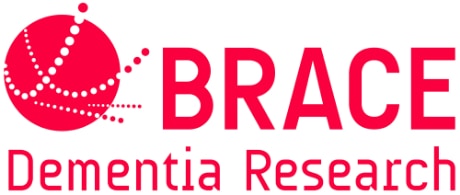Susan Marshfield MBE
How long have you been involved with BRACE?
Almost 30 years! BRACE had just formed when my late husband went to the old clinic at Blackberry Hill Hospital. Professor Wilcock and Mary Sansbury, who were co-founders of BRACE, were among the doctors there. I was introduced to Mary by Professor Wilcock, because she was looking for people to support the new charity.
When did your late husband’s battle with dementia start?
Jack’s battle with dementia started quite abruptly. The directors of the company he worked for sold up, so he made the decision to leave. It was during this time things started to get quite difficult, so we went to the GP. We were sent to the memory disorder clinic at Blackberry Hill. In those days there was very little support.
At the time I was a Councillor, but I had to leave to find paid work as Jack couldn’t work. At this point he started to do odd things; I would come home to find he had put ten teabags in the kettle, as he’d added a tea bag each time he wanted a cup of tea.
When did things get worse?
One day, I got home and discovered that he wasn’t there, at which point I had to change how I cared for him. He was spotted by a lorry driver near a motorway junction. Thankfully, the driver called the police and he was picked up. From then on though, he was not left alone.
How did Jack’s dementia affect you and your family, and were your children supportive?
I have two sons, both supportive in their own way. One who lives nearby could cope with Jack’s dementia; if I ever badly needed help, such as getting Jack into the bath, I could call him and he would come to help. My younger son found the last 18 months of Jack’s life very difficult. He found seeing his father incredibly upsetting. He wanted to remember Jack as he had been, not this person who didn’t know him.
For the last two or three years Jack thought I was his mother. He said he kept seeing this other man in the house; I assured him that there wasn’t anyone else in the house. But one day he pointed at his reflection in the mirror, saying “that’s him”. When I said it was his own reflection, he said “well if I ever looked like that, I’d kill myself”. He thought he was a young man, adding “he looks as old as you, and you’re my mother!”. That was quite hard to come to terms with, and even though it happened a long time ago, I still think about it sometimes.
Eventually Jack developed pneumonia and spent his last two weeks in Professor Wilcock’s ward at Blackberry Hill Hospital. I would go in to feed him, but he became unable to swallow or talk, even walking was extremely difficult. He died aged 67.
He was 59 when diagnosed. I wouldn’t wish him the last two years of his life. It’s almost cruel in a way, for someone who has always been active to have to live this way and for the family to have to watch and know how little they can do.
What was Jack like?
Jack was very much a family person and did lots of things with our boys. For two years he ran a local junior football team so that our son and his friends could play. He was also a good footballer in his youth and played for Brentford juniors. These boys often became ball boys on Saturday for the big clubs and he did his stints at Arsenal, a team he supported for the rest of his life.
In our household we all supported different teams! Jack; Arsenal, Me; Sunderland, older son; West Ham, younger son; Tottenham. We were quite competitive about it!
Jack also had two West Highland White Terriers to keep him company, and he enjoyed being with them. Sadly, one of them died after Jack was diagnosed, but the other kept going until a few months after Jack’s death.
Why Should people support BRACE?
People should support BRACE because it’s a more personal charity. Alzheimer’s Research UK and the Alzheimer’s Society raise lots of money and do lots of research, but for people like me who have experienced the disease, I feel BRACE is more personal. It’s local to the South West and you can see where your money is going, especially if you attend the events BRACE puts on.
When I met Prince William when I collected my MBE, I told him about my involvement with BRACE. He told me “You stay with that. In the next 20 years we have to break through because there’ll be thousands more in need”. He was right. We are all living longer and we need to take note of that. It’s very important that charities like BRACE are supported so that research can continue.
Share this page
